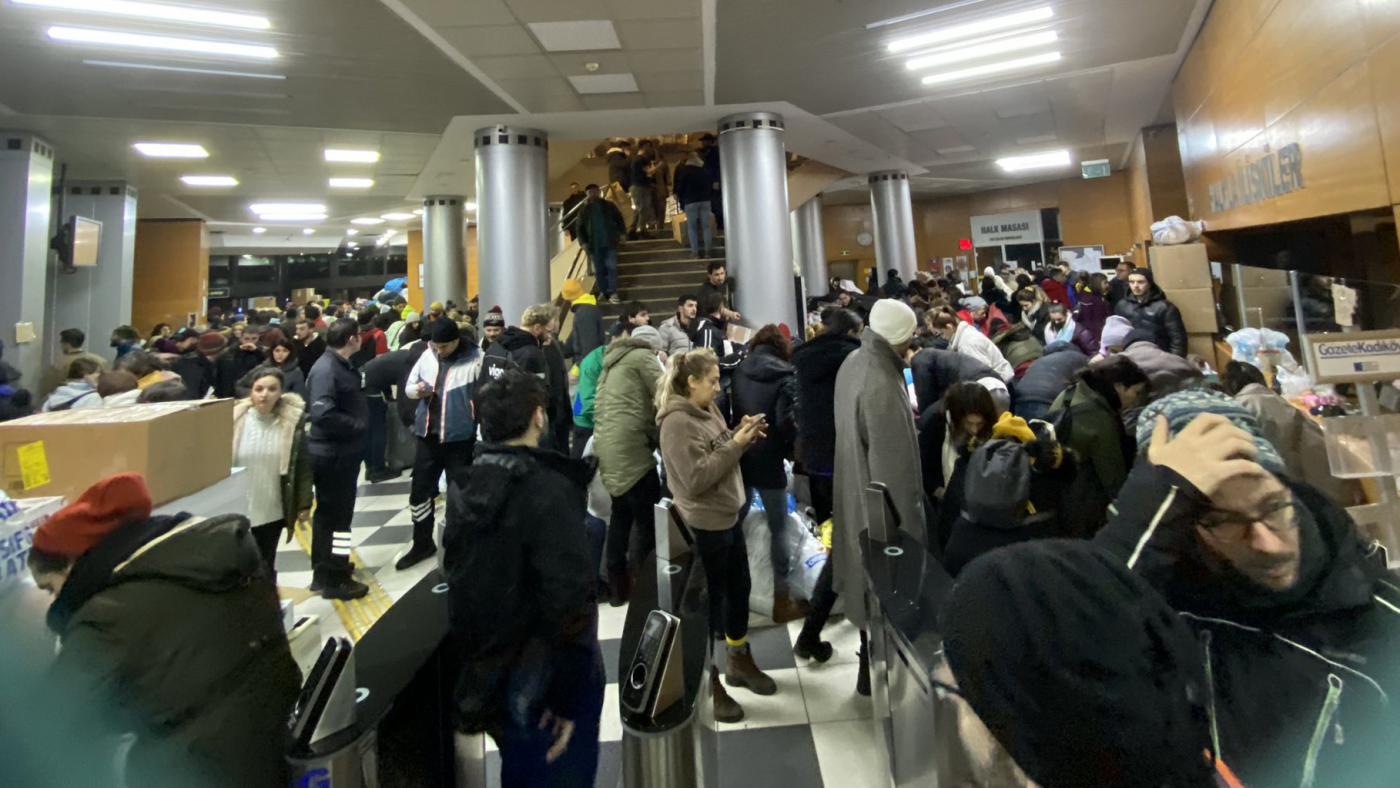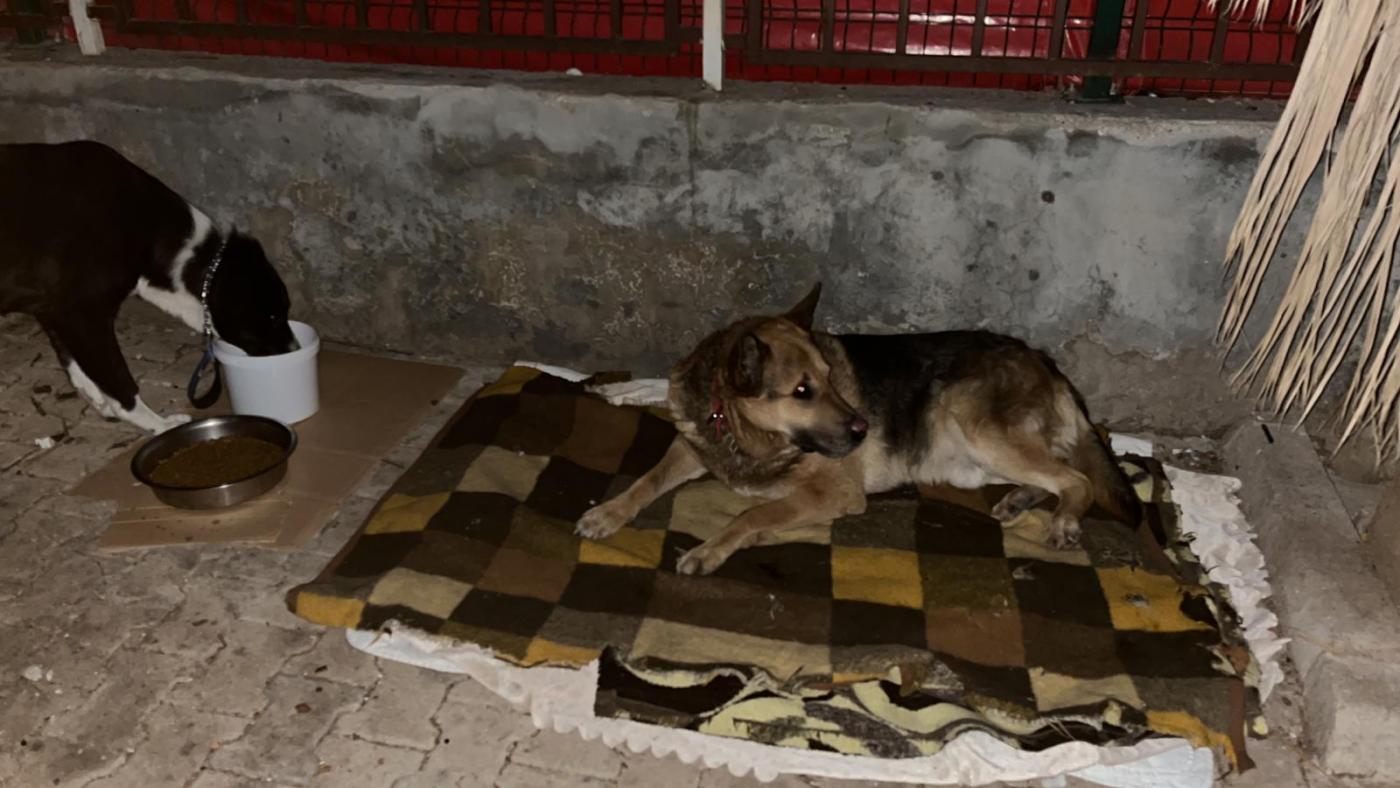UU-student in Istanbul reports
‘Since the earthquake, the ticking of time is no longer ordinary’

It’s debatable to speak of luck when you’re surrounded by so much misery. Nevertheless I’m thankful that the cities of Mersin and Tarsus, where my family comes from, weren’t struck by the earthquakes considering that they’re located next to the affected area. I’m in Istanbul myself and ever since I’ve heard the catastrophic news, I’ve descended into a collective haze of powerlessness together with the rest of Turkey and Syria. I hear, see, and sense from everything that life has stopped and there’s only one thing left that matters: the consequences of the earthquake. The first quake happened early in the morning on Monday last week and nine hours later, a second quake finished what the first one didn’t succeed in destroying. Final state: a completely destroyed region that looks like a warzone.
Nobody feels the need to open their shop and that they’re all at home watching television, glued to the news.
Since the first earthquake, the ticking of time is no longer an ordinary thing. Instead it’s the only thing that still matters. The beats of the clock are falling down, hitting us hard. Every minute matters, because the more time passes by, the smaller the chances are of finding survivors amidst the debris. It’s knowledge we all have to surrender to. In the days of the aftermath, my powerlessness translates into the urge to constantly move. I walk out of my house and while I run down the stairs, every step is still where I last left it. Like a zombie I start walking down the streets and wards of Istanbul, looking for a purpose, for a meaning. The homes in my ward are still upright, but if the earthquake we’ve felt here a few months ago had been worse, that could have been very different.
I follow my usual route up the hill towards the university campus. Normally I have a fixed riddle of people I shortly speak to or wave hello to, whilst I walk the short kilometre to campus. This time, I don’t see anyone and the streets are much more quiet than usual. I suspect that nobody feels the need to open their shop and that they’re all at home watching television, glued to the news.
Once I arrive at the campus, things are eerily calm. Even the cats and dogs are less present than usual. I eat my lunch in the mensa and then move to the atelier to write. I can’t seem to write, and I’m starting to get into a fight with time. It keeps on ticking, leaving me in despair.
There’s a constant stream of messages from people who are underneath the debris being shared. Through social media everyone is crying for help that is still not there yet.
Since the university is deserted and I haven’t seen my friends yet, I decide to call the ones that are still in Istanbul. The earthquake happened during the winter holidays, so many students are with their families. My friends are sad and I can tell that they too don’t know what to do with themselves. They decide to stay home in their own numbed state
However calm the university is, there’s a huge hustle and bustle in all university group chats I’m in. There’s a constant stream of messages from people who are underneath the debris being shared. Through social media everyone is crying for help that is still not there yet. It’s dystopic that on Google Maps I can see exactly in which streets people are fearing for their lives.
In the days that follow I keep walking around like a mad person and eventually find two days of peace at the town hall, packing boxes for the victims. I’m not the only one with this idea.
More people from the city have come to help. Together we’re processing the earthquake. This is a collective pain. At the end of the day, taxi drivers offer to drive people home at no cost. Despite there being no system for packing boxes and the place being chaotic, I suspect that, besides helping, we’re mainly here to not feel alone and to find a sense of community. Packing boxes has a social function: we try to be there for you.
My friend is furious at her aunt who doesn’t want to leave her destroyed village. 60 of her fellow villagers have died and together with some others she’s one of the few who have survived.

My friend sends pictures. Her aunt did not want to leave the disaster area without her dogs.
The first three days I stay in in contact with a friend whose family has been badly affected by the earthquake. I send her a message every day, so she knows I’m there for her as soon as she can make contact. After three days, she calls me and talks for an hour and a half out of pure frustration and joy that we can speak. She’s furious at her aunt who doesn’t want to leave her destroyed village. 60 of her fellow villagers have died and together with some others she’s one of the few who have survived.
“She refuses to go. First because of her two dogs. She didn’t want to leave without them, so we arranged that they could come with. Then she didn’t want to leave her home because she was afraid of thieves. What the fuck are those thieves supposed to steal? There’s nothing left! Now that she has nothing left to say she’s sitting between the ruins drinking tea and sending me pictures of herself drinking tea. I’ve tried everything, but she just flat out refuses! I’ve threatened to personally come and get her but that wasn’t possible either. Typical for old people. They always want to stay. “Irem, she could die.” “Yes, I know, it’s bizarre.” At the moment that I’m writing this her aunt meanwhile has been brought to a safe place. Her aunt wasn’t the only elderly person who refused to leave. It’s still your home. But that doesn’t take away from the fact that her situation was extremely dire, in those first 24 hours after the earthquake no one came to help, and they were left there to fend for themselves.
My friend also tells me that she feels guilty because she’s only thinking about her ow family. I try to reassure her by saying that if everyone thinks of one someone, then everyone thinks of everyone. But while I say the words, I know that it doesn’t work that way. Who thought about these people before the earthquake, when safe homes needed to be built for them. No one did. Moreover, this is one of the most economically and administratively neglected regions in Turkey. On top of that, no one at all is thinking about northern Syria. Thanks to the civil war, Assad's interference, and inadequate UN action, aid convoys have barely arrived there yet.
Everyone I talk to, including myself, we’re all feeling guilty.
After three days of walking around I go home and crash on the couch together with my cats. I start crying incessantly and tears are running down my cheeks, joining the rest of the Turkish, Kurdish, and Syrian tears. A disaster like this has many facets, including guilt with people to whom nothing has happened. Everyone I talk to, including myself, we’re all feeling guilty. I remember what my music teacher told me: “I started crying for all the people there, if we can’t even do that, are we even human?
Now that the most critical days for finding survivors are behind us, everyone is slowly picking up their lives again. We start waking up from the crippling grief and our initial shock. The devastation starts to make way for anger. We’re angry, very angry. On Monday 7 February we were not only struck by a natural disaster. The active fault lines also exposed the wickedness of corruption in construction over the past 20 years. People did not follow safety regulations while building houses and flats, the result of which is now painfully obvious. All these houses would not have collapsed if they had been built safely. This can be proved because in the southern Turkish city of Erzin there have been zero casualties thanks to the mayor's strict building policy. And the people responsible for this know it too, because one after the other are trying to flee the country, several contractors (and others involved) have already been arrested and this will only increase.
The realization that the same could happen in Istanbul is all the more frightening. How many casualties would there be here if an earthquake would hit. And it will, we all know that. The AKP, President Erdogan's political party was able to gain power partly because of the failed response to the 1999 earthquake by the ruling government at the time.
Since Monday, Erdogan has announced seven days of national mourning, but this mourning won’t stop after seven days, and it won’t stop at the Turkish-Syrian border..
Hopefully, we will see the same fate await Erdogan and his entourage in the upcoming elections in May. Still, one cannot speak of a political gain in such a case. For that, we have had to say goodbye to too many people. Moreover, in Turkey it apparently does not matter who has the power. There is no good governance, there wasn’t then and there isn’t now. While the lessons every earthquake teaches us are pretty simple and the same: build safely and prepare adequately. Unfortunately, rulers prove hard-learned when money is involved. People paid a lot of money for their own cemetery. This is not a natural disaster, this is murder.
Since Monday, Erdogan has announced seven days of national mourning, but this mourning won’t stop after seven days, and it won’t stop at the Turkish-Syrian border. It extends to the rest of the world who online and through the news, like most of us, are part of a disaster of which the proportions are far, far too large for what actually happened. All those people did not deserve that. To those of whom we sadly have to say goodbye, there is only one thing left for me to say: Allah rahmet eylesin, nur icinde yatsinlar ve mekanlari cennet olsun. (May God have mercy on them, may they rest in peace and may their places be in heaven).
